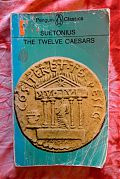
Suetonius
The Twelve Caesars
Gaius Suetonius Tranquillus was maybe born in 69 AD. Eventually he came to work for Emperor Hadrian as secretary, but was fired for carrying on with Hadrian’s wife Sabina. Suetonius wrote lots of books, such as The Lives of Famous Whores and The Physical Defects of Mankind, but the only book to survive in full was The Twelve Caesars. This book has aged well; it is fascinating and enjoyable. Robert Graves’ translation works like a face lift, with little sacrifice to Suetonius’ old voice.
As I read The Twelve Caesars, I had the keen sense of reading a study in human nature before Christianity introduced its motherload of morals. The checks and balances which we moderns use in our lives did not seem to exist then or at least in the same caliber. Death was avenged by more death; it is a wonder that there was ever peace. There was as little peace as there were emperors whose power did not go to their heads. Fear of assassination inspired unjust executions which in turn inspired enough resentment to conspire to assassinate. Of the twelve, only a couple are suspected of dying a natural death.
And how many of them deserved their poison! Suetonius spares no details of atrocities: torture, murder, exile, they had no scruples about killing off their family. Most of the emperors’ reign began benignly enough, distributing money, building temples, making an impression on the Senators and the people. But after a couple years, degeneration set in, or as Suetonius put it, they revealed their true characters. An example:
In Capri they still show the place at the cliff top where Tiberius used to watch his victims being thrown into the sea after prolonged and exquisite tortures. A party of marines were stationed below, and when the bodies came hurtling down they whacked at them with oars and boot-hooks, to make sure that they were completely dead.
The emperors were also as unscrupulous about their bed partners. Some would take a woman from her husband, to marry or just to sleep with, then to divorce or to execute. Nero is quoted as approving of lovely necks because he could easily swipe his sword through them. Apparently only Claudius was only interested in women; the others having young catamites or were the catamites themselves. Nero’s�again�shouts and moans were heard throughout the palace as he was penetrated. (In Rome, the only real sex taboo, for men, was to be the passive one.)
Perhaps my favorite part of each Caesar’s life was when Suetonius broke down the series of lucky omens that predestinated an emperor to the throne and predicted his victories; then the unlucky omens that foretold his death. Accordingly, Augustus’ accession�who along with Julius Caesar formed the new Imperial Rome�was heavily predicted, his birth called divine, as a child he was recognized in dreams.
Gaius Drusus records that, one evening, the infant Augustus was placed by the nurse in his cradle on the ground-floor, but had vanished by daybreak; at last a search party found him lying on the top of a lofty tower, his face turned towards the rising sun.
But for all these differences of centuries past, there are similarities between the Caesars and our rulers, between those crowds and our crowds. Power has always worked its way into men’s minds like a poison. And occasionally, man can lift himself up, once in awhile there is an Augustus or a Vespasian, not perfect, but better .
· · · · · · · · · · · · · · · · · · · ·